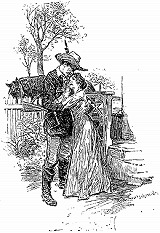Young Jefferson Hope rode on with his companions, gloomy and taciturn. He and they had been among the Nevada Mountains prospecting for silver, and were returning to Salt Lake City in the hope of raising capital enough to work some lodes which they had discovered. He had been as keen as any of them upon the business until this sudden incident had drawn his thoughts into another channel. The sight of the fair young girl, as frank and wholesome as the Sierra breezes, had stirred his volcanic, untamed heart to its very depths. When she had vanished from his sight, he realized that a crisis had come in his life, and that neither silver speculations nor any other questions could ever be of such importance to him as this new and all-absorbing one. The love which had sprung up in his heart was not the sudden, changeable fancy of a boy, but rather the wild, fierce passion of a man of strong will and imperious temper. He had been accustomed to succeed in all that he undertook. He swore in his heart that he would not fail in this if human effort and human perseverance could render him successful.
He called on John Ferrier that night, and many times again, until his face was a familiar one at the farmhouse. John, cooped up in the valley, and absorbed in his work, had had little chance of learning the news of the outside world during the last twelve years. All this Jefferson Hope was able to tell him, and in a style which interested Lucy as well as her father. He had been a pioneer in California, and could narrate many a strange tale of fortunes made and fortunes lost in those wild, halcyon days. He had been a scout too, and a trapper, a silver explorer, and a ranchman. Wherever stirring adventures were to be had, Jefferson Hope had been there in search of them. He soon became a favourite with the old farmer, who spoke eloquently of his virtues. On such occasions, Lucy was silent, but her blushing cheek and her bright, happy eyes showed only too clearly that her young heart was no longer her own. Her honest father may not have observed these symptoms, but they were assuredly not thrown away upon the man who had won her affections.
One summer evening he came galloping down the road and pulled up at the gate. She was at the doorway, and came down to meet him. He threw the bridle over the fence and strode up the pathway.
“I am off, Lucy,” he said, taking her two hands in his, and gazing tenderly down into her face: “I won’t ask you to come with me now, but will you be ready to come when I am here again?”
“And when will that be?” she asked, blushing and laughing.
“A couple of months at the outside. I will come and claim you then, my darling. There’s no one who can stand between us.”
“And how about father?” she asked.
“He has given his consent, provided we get these mines working all right. I have no fear on that head.”
“Oh, well; of course, if you and father have arranged it all, there’s no more to be said,” she whispered, with her cheek against his broad breast.

“Thank God!” he said, hoarsely, stooping and kissing her. “It is settled, then. The longer I stay, the harder it will be to go. They are waiting for me at the canon. Good-bye, my own darling - good-bye. In two months you shall see me.”
He tore himself from her as he spoke, and, flinging himself upon his horse, galloped furiously away, never even looking round, as though afraid that his resolution might fail him if he took one glance at what he was leaving. She stood at the gate, gazing after him until he vanished from her sight. Then she walked back into the house, the happiest girl in all Utah.